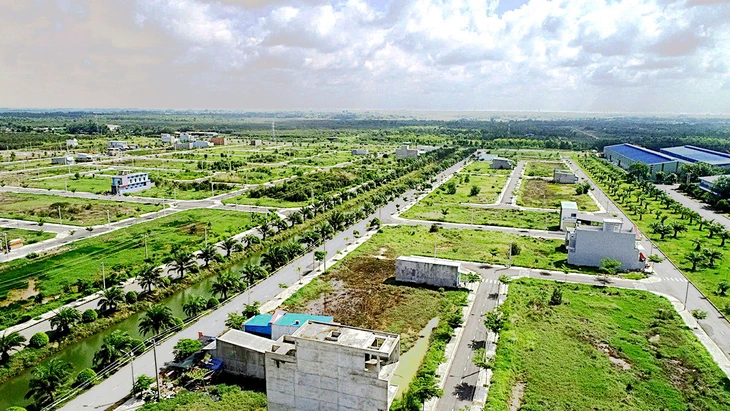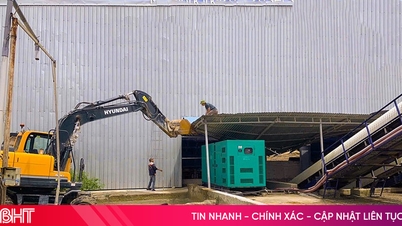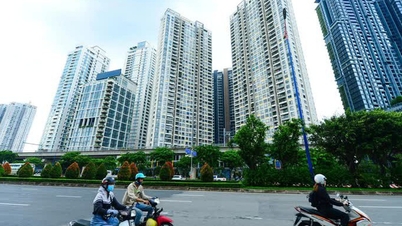
The investor of the Hong Dat residential area project - Long An is at risk of having to pay hundreds of billions in additional land fees, even though he is not at fault for the delay in determining land prices - Photo: SON LAM
As reported by Tuoi Tre Online , Decree 103 on land use fees and land rents is receiving many comments when applying an additional land fee of 5.4% on the amount of land payable during the period when the land fee has not been calculated.
The Ministry of Finance is seeking comments to amend the decree.
MSc. Ngo Gia Hoang (lecturer of the Faculty of Commercial Law, Ho Chi Minh City University of Law) sent Tuoi Tre Online an article providing additional perspectives on this issue.
Regulations on additional collection of 5.4% land use fee in Decree 103
According to Clause 2, Article 50 of Decree 103/2024/ND-CP regulating land use fees and land rents, for projects that have had decisions on land allocation, land lease or permission to change land use purposes before August 1, 2024 but have not yet determined the land price, land users will have to pay an additional amount equivalent to 5.4%/year on the amount of land use fees payable during the period awaiting valuation.
This regulation is based on Clause 2, Article 257 of the 2024 Land Law, which aims to ensure the principle of not losing budget revenue during the land use period without completing financial obligations.
Specifically, Article 257 of the 2024 Land Law stipulates land finance policies and land prices for cases where there are decisions on land allocation, land lease, permission to change land use purposes... but land prices have not been decided before the effective date of this law (August 1, 2024).
In principle, the new law does not apply retroactively to decisions and administrative acts issued before the law takes effect.
Therefore, in cases where there has been an administrative decision (land allocation, land lease, land use change...) before the effective date, but the land price has not been determined, the determination of land price must still be based on the principles and policies at the time of issuance of that decision, and not apply new regulations.
Point d, Clause 2, Article 257 of the 2024 Land Law stipulates that the Government provides detailed guidance on the additional amount of money that land users must pay for the period during which land use fees and land rents have not been calculated.
From the above regulations, in the previous period, if the land user has not calculated the land use fee (due to not determining the land price in time), they will have to pay an additional amount. This amount is calculated at 5.4%/year on the amount of land use fee payable.
Regulations lack flexibility for each specific case
The fact that the law stipulates a "hard" collection rate of 5.4%/year but does not clearly explain the basis for determining this collection rate, and is not linked to a market-based adjustment mechanism or specific tool is unreasonable, easily leading to a lack of flexibility, and easily causing controversy about its reasonableness.
The above calculation method lacks classification and flexibility for each project group, and does not distinguish between cases due to objective errors (due to the competent authority's delay in determining land prices or due to the investor).
If businesses comply with legal procedures but have to passively wait for authorities to appraise land prices, they will be charged additional fees, causing investment costs to increase even though it is not their fault.
This increases legal and financial risks, affects investors' ability to forecast, and puts pressure on cash flows, especially in difficult market contexts.
The consequence is a reduction in project implementation motivation, affecting housing supply and production and business premises, and being inconsistent with economic recovery policies.
Land use fee is an input investment cost (land cost), similar to the cost of purchasing raw materials, infrastructure construction costs, etc., so it will be included in the cost of real estate products and then converted into the selling price for buyers.
Therefore, this collection will inevitably shift the financial burden to the home buyer (if the business has not sold the house), or reduce the investment profit earned if the product has been sold.
Usually, after selling a house to a buyer, the enterprise must pay this additional land use fee, so the enterprise no longer has the right to increase the selling price or adjust the financial obligations in the signed house sale contract.
Therefore, businesses are forced to bear this additional collection, leading to legal and financial risks, especially for projects that were handed over many years ago but are stuck in determining land prices.
When should businesses be exempt from additional land fees?
Authorities need to classify cases into different groups:
In case of late payment of land use fees due to the fault of the competent authority (due to the failure to determine the land price), the enterprise should be exempted from the additional land use fee, in order to enhance the responsibility of the competent authority in determining the land price.
At the same time, protect the legitimate rights of enterprises in cases of objective errors, ensuring the principles of fairness and transparency in land financial management.
In case the delay in determining land price is due to the enterprise's fault, the enterprise must pay additional land use fees.
In principle, land use fees and interest will only be collected if the enterprise has sufficient basis to determine its financial obligations but deliberately fails to perform them.
Accordingly, there should be detailed guidance on which specific situations are considered land user faults, to avoid abuse or arbitrary application.
Source: https://tuoitre.vn/bat-cap-tien-dat-bo-sung-can-co-huong-dan-chi-tiet-cho-tung-truong-hop-cu-the-20250613105735746.htm


![[Photo] President of the Cuban National Assembly visits President Ho Chi Minh's Mausoleum](https://vphoto.vietnam.vn/thumb/1200x675/vietnam/resource/IMAGE/2025/10/1/39f1142310fc4dae9e3de4fcc9ac2ed0)
![[Photo] Hanoi morning of October 1: Prolonged flooding, people wade to work](https://vphoto.vietnam.vn/thumb/1200x675/vietnam/resource/IMAGE/2025/10/1/189be28938e3493fa26b2938efa2059e)

![[Photo] Keep your warehouse safe in all situations](https://vphoto.vietnam.vn/thumb/1200x675/vietnam/resource/IMAGE/2025/10/1/3eb4eceafe68497989865e7faa4e4d0e)
































































































Comment (0)